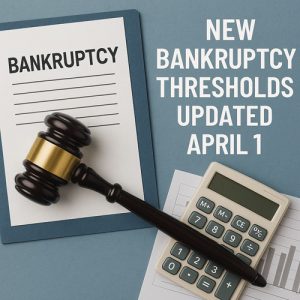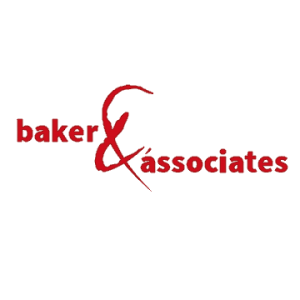
Many of our recent posts have covered critical debt issues — such as managing credit card debt, navigating job-related financial strain, and understanding bankruptcy basics and the power of the automatic stay. Now, with important changes to bankruptcy thresholds taking effect on April 1, 2025, there’s even more to consider.
What’s Changing on April 1, 2025?
Under the Bankruptcy Code’s inflation-adjusted update, several key thresholds increased by approximately 13.2% Here’s what’s especially important:
- Chapter 13 secured debt limit rises to $1,580,125
- Involuntary petition claim minimum jumps to $21,050
What This Means for You:
- If your secured debt (like a car loan or mortgage) is approaching the previous cap of $1.5M, the new threshold may now open up eligibility for Chapter 13, potentially offering you more flexibility than before.
- These changes also improve the feasibility of filing against debtors via involuntary petitions.
Should You Reconsider Bankruptcy Now?
Recent blog posts highlighted key reasons people file:
- Credit card debts spiraling out of control
- The protection offered by the automatic stay
- The process and eligibility for Chapter 7 vs. Chapter 13
Combining this with the new thresholds, it may be a perfect time for those previously ineligible for Chapter 13 (due to secured debt size) to explore this option. Chapter 13 allows manageable repayment plans plus stronger protections against creditors.
Smart Steps to Take Now
1. Re‑evaluate Your Debt Profile
Gather current figures for:
- Unsecured debt (credit cards, medical bills)
- Secured debt (mortgages, auto loans) Compare them with the new thresholds to see where you might fall.
2. Explore Chapter 13 Even If You’re Overwhelmed by Debt
If filing Chapter 7 looks like your only option, Chapter 13 might now be within reach—even with higher secured debts—which can offer more control and better creditor protection.
3. Don’t Ignore the Required Credit Counseling
As required by law, complete both pre-filing credit counseling and post-filing financial management courses to ensure your case moves smoothly .
4. Leverage the Automatic Stay
As our blog has demonstrated, once you file (Chapter 7 or 13), creditor harassment halts immediately. The stay prevents collection, foreclosure, garnishment, and lawsuit actions giving you immediate relief.
Need Personalized Guidance?
If you are seeking more information about bankruptcy or whether bankruptcy might benefit you, contact an experienced Houston bankruptcy attorney for a consultation.
Baker & Associates’ attorneys have a combined 50 plus years of experience in bankruptcy law. Reese W. Baker has been practicing bankruptcy law since the mid-1980s and is amongst the few lawyers certified in both consumer and business bankruptcy by the Texas Board of Legal Specialization. He’s also certified by the American Board of Certification in business bankruptcy.
To learn more or schedule your free consultation, call us today at (713) 979-2279 or fill out our contact form.
